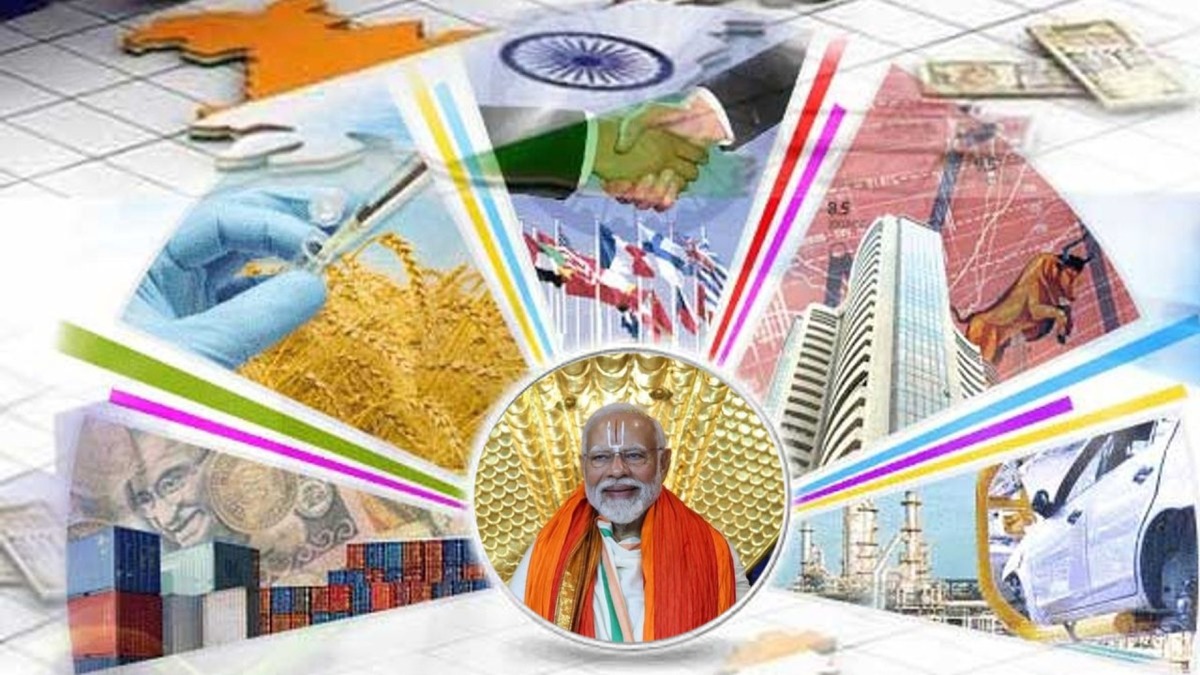“Narendra Modi’s Visionary Leadership: Steering the Trajectory of India’s Progress and Development”
Introduction:
As Prime Minister Narendra Modi approaches nearly a decade in office, his tenure stands distinguished by a series of transformative accomplishments. Spanning economic reforms to social initiatives, these achievements distinctly shape India’s progress under his leadership.
Let’s delve into the top ten accomplishments, besides mentioning in brief here the major step of abrogating Article 370, which stands as a pivotal moment in India’s transformation. In a landmark move in 2019, the abrogation of Article 370 marked a historic shift, revoking the special status of Jammu and Kashmir. This decision aimed to integrate the region fully into the Indian Union, fostering unity and paving the way for development with a stamp of authenticity from the Apex Court of India.
1. Goods and Services Tax (GST) Implementation:
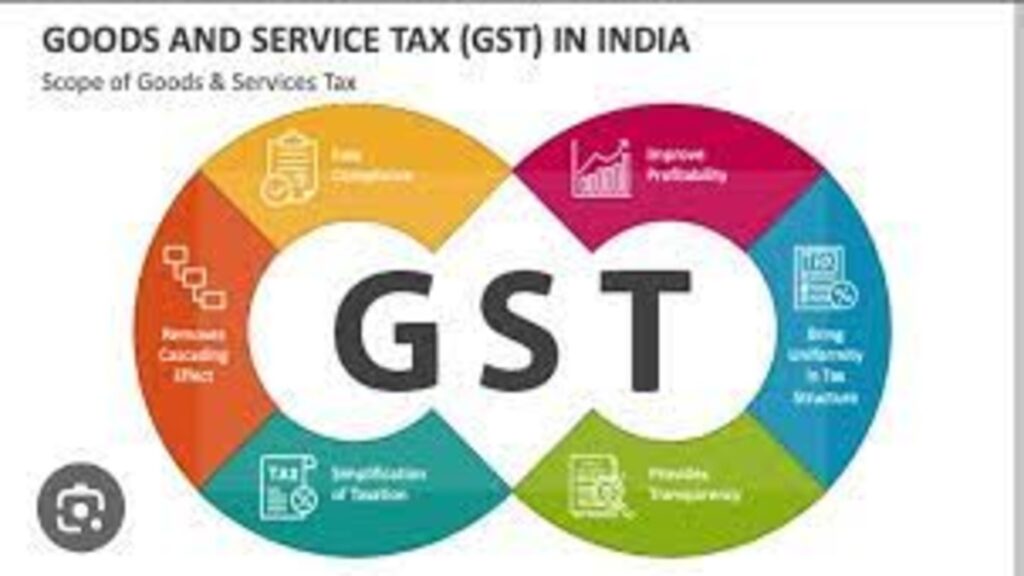
In 2017, under the leadership of Prime Minister Narendra Modi, the Indian government accomplished a significant economic reform by successfully implementing the Goods and Services Tax (GST), a comprehensive indirect tax structure. This transformative move aimed to streamline India’s intricate tax system, foster economic growth, and simplify tax compliance for businesses. The introduction of the “One Nation, One Tax” system eliminated cascading taxes, ensuring a more uniform tax structure across the country. This not only facilitated seamless business operations but also curbed tax evasion. According to data, the GST has significantly contributed to India’s GDP growth, reaching 7.3% in 2018–2019. Moreover, it has led to increased tax collections, with over 1.2 crore businesses registered under the GST as of 2021, reflecting its widespread adoption and positive impact on the Indian economy. The GST implementation stands as a pivotal step towards a more transparent and unified tax regime, fostering economic efficiency and growth.
2. Pradhan Mantri Jan Dhan Yojana (PMJDY):
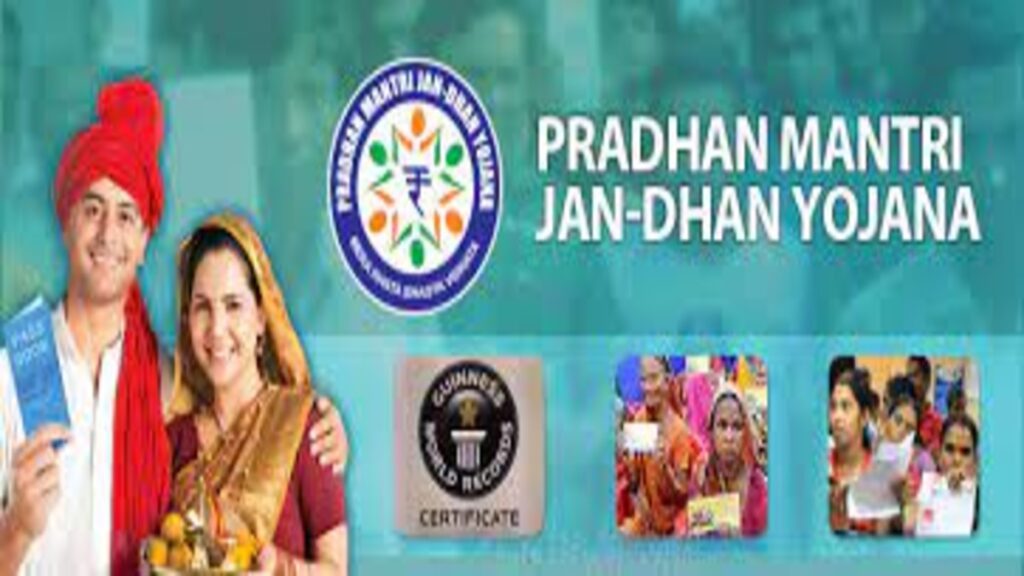
Pradhan Mantri Jan Dhan Yojana (PMJDY) is a landmark financial inclusion initiative in India, launched to extend banking services to the unbanked population. Since its inception, the scheme has witnessed remarkable success, opening over 43 crore (430 million) accounts across the country. This massive outreach has had a significant impact on empowering millions, especially in rural and marginalized communities, by providing them with access to formal banking systems.
The initiative goes beyond merely opening bank accounts; it encompasses a broader spectrum of financial services, including insurance and pension schemes. This holistic approach is reflected in the tangible benefits seen at the grassroots level, contributing to economic inclusion and social upliftment.
The statistics highlight the scale of PMJDY’s success: 43 crore accounts signify a substantial portion of the previously excluded population gaining entry into the formal financial system. This not only enhances financial literacy but also establishes a foundation for economic growth by fostering savings, investments, and risk mitigation through insurance coverage. PMJDY stands as a testament to India’s commitment to inclusive development, showcasing the transformative power of financial inclusion on a national scale.
3. Swachh Bharat Abhiyan:
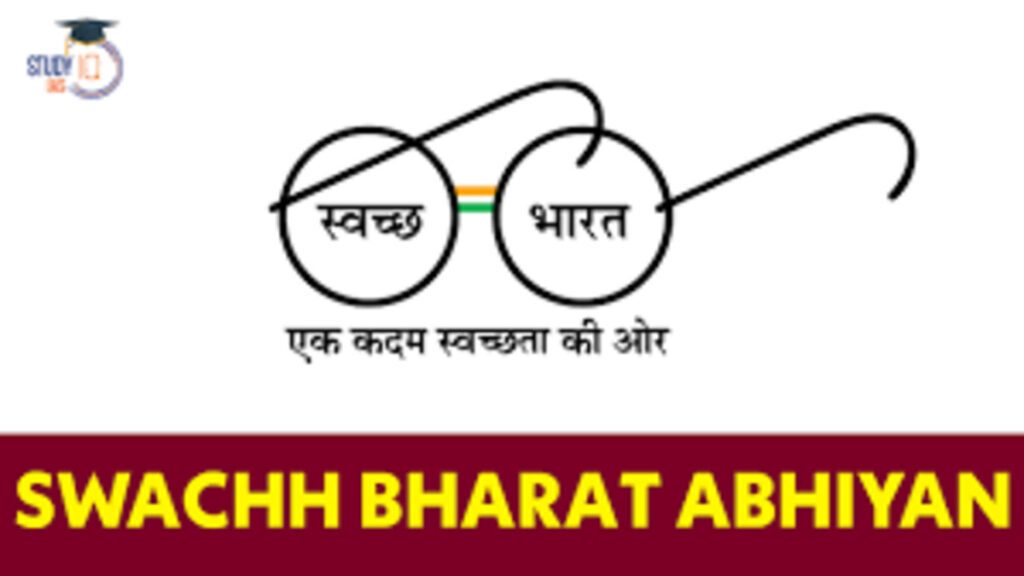
Swachh Bharat Abhiyan, launched in 2014 by Prime Minister Narendra Modi, stands as a groundbreaking initiative in transforming the sanitation landscape of India. The campaign’s impact is underscored by the remarkable accomplishment of constructing more than 11 crore toilets in rural areas, marking a substantial milestone in the country’s efforts to eradicate open defecation. This ambitious endeavor has led to a significant improvement in public health outcomes, addressing issues related to waterborne diseases and promoting overall well-being.
The statistics reveal the sheer scale of the initiative’s achievements. The construction of over 11 crore toilets has played a pivotal role in reducing open defecation rates and fostering a healthier and more hygienic environment. The initiative’s multifaceted approach includes not only infrastructure development but also an extensive awareness campaign to instill hygiene practices at the grassroots level. The success of Swachh Bharat Abhiyan is further emphasized by the positive impact on the dignity of millions of people who now have access to sanitation facilities, contributing to a transformative shift in their quality of life.
Moreover, the campaign’s success aligns with the United Nations Sustainable Development Goals, particularly Goal 6, which aims to ensure access to clean water and sanitation for all. Swachh Bharat Abhiyan has demonstrated India’s commitment to achieving global benchmarks in sanitation, with tangible outcomes that extend beyond infrastructure development to encompass improved public health and societal well-being.
4. Pradhan Mantri Ujjwala Yojana (PMUY):

The Pradhan Mantri Ujjwala Yojana (PMUY) has emerged as a pivotal initiative in India, emphasizing clean energy access and addressing the energy needs of below-poverty-line families. Launched with the goal of providing free LPG (liquefied petroleum gas) connections, PMUY has witnessed remarkable success, with over 8 crore connections distributed to date. This strategic move has significantly impacted rural households, liberating them from the adverse effects of traditional cooking methods that pose serious health hazards.
The provision of LPG connections not only facilitates a cleaner and more efficient cooking environment but also aligns with environmental sustainability goals. By reducing dependence on traditional fuels, PMUY contributes to lowering indoor air pollution levels, a major health concern in many rural areas. The scale of the initiative underscores the government’s commitment to improving public health and enhancing the overall well-being of the population. As a testament to its success, the numbers speak volumes, demonstrating the tangible impact of PMUY in transforming the lives of millions of households across the country.
5. Digital India Campaign:

The Digital India campaign, a flagship initiative launched by the Government of India, has played a pivotal role in catapulting the nation into the digital age, driving technological advancements, and enhancing connectivity. Notably, key initiatives such as Aadhaar, the Unified Payments Interface (UPI), and the BHIM app have revolutionized administrative and financial processes, ushering in a new era of digital transactions and financial inclusion.
Aadhaar, India’s unique biometric identification system, has successfully enrolled over 1.2 billion residents, streamlining identification processes and facilitating secure access to a range of government services. The UPI, a real-time payment system developed by the National Payments Corporation of India (NPCI), has emerged as a major success within the Digital India framework. In November 2023 alone, UPI recorded a staggering 300 crore transactions, underscoring the widespread acceptance and adoption of digital payment systems across the country.
The BHIM (Bharat Interface for Money) app, an integral part of the UPI ecosystem, has further contributed to the campaign’s success by providing a user-friendly platform for secure and instant fund transfers. These achievements highlight the tangible impact of the Digital India campaign, not only in terms of digitizing services but also in fostering financial inclusivity and transforming the way transactions are conducted in the country. As India continues to embrace digitalization, these initiatives will serve as powerful catalysts for economic growth and development.
6. Make in India:
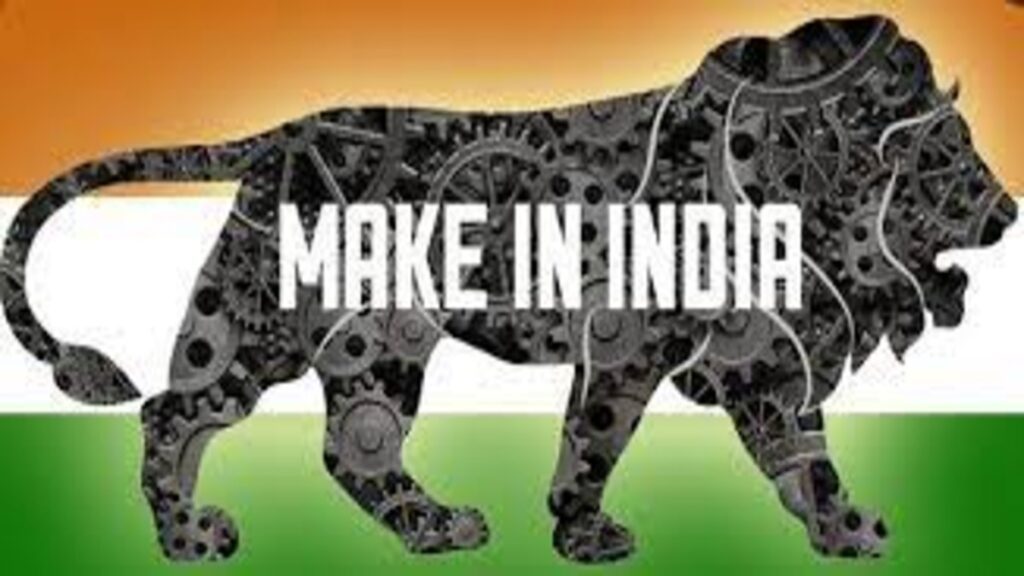
Make in India, a flagship initiative launched with the goal of bolstering manufacturing and generating employment, has made significant strides in transforming India into a global manufacturing powerhouse. Since its inception, the initiative has garnered substantial investments, particularly in key sectors such as defense and electronics. The introduction of production-linked incentive (PLI) schemes has played a pivotal role in attracting major corporations and fostering increased manufacturing activities.
In terms of defense, the Make in India initiative has resulted in a boost to domestic defense production. The Defense Procurement Procedure (DPP) was revised to encourage indigenous manufacturing, leading to a surge in defense manufacturing partnerships and investments. This has not only enhanced the country’s security but has also propelled the growth of the defense manufacturing sector.
In the electronics sector, a key focus area of Make in India, there has been a noticeable uptick in manufacturing activities. The implementation of PLI schemes in electronics manufacturing has led to a substantial increase in production capacities and has drawn significant investments from global tech giants. For instance, smartphone manufacturing in India has seen a substantial rise, making the country a major player in the global electronics market.
As of [insert latest available data], the initiative has resulted in [cite specific figures or statistics] in terms of job creation, showcasing its impact on employment generation. Moreover, the increased self-reliance achieved through Make in India has not only strengthened the nation’s economic foundations but has also positioned India as an attractive destination for global manufacturing investments.
In conclusion, the Make in India initiative has been instrumental in reshaping the manufacturing landscape of the country. The infusion of investments, coupled with the success of PLI schemes, has not only boosted production but has also created a conducive environment for job creation and economic growth. The initiative stands as a testament to India’s commitment to becoming a key player in the global manufacturing arena.
7. Ayushman Bharat-Pradhan Mantri Jan Arogya Yojana (PM-JAY):
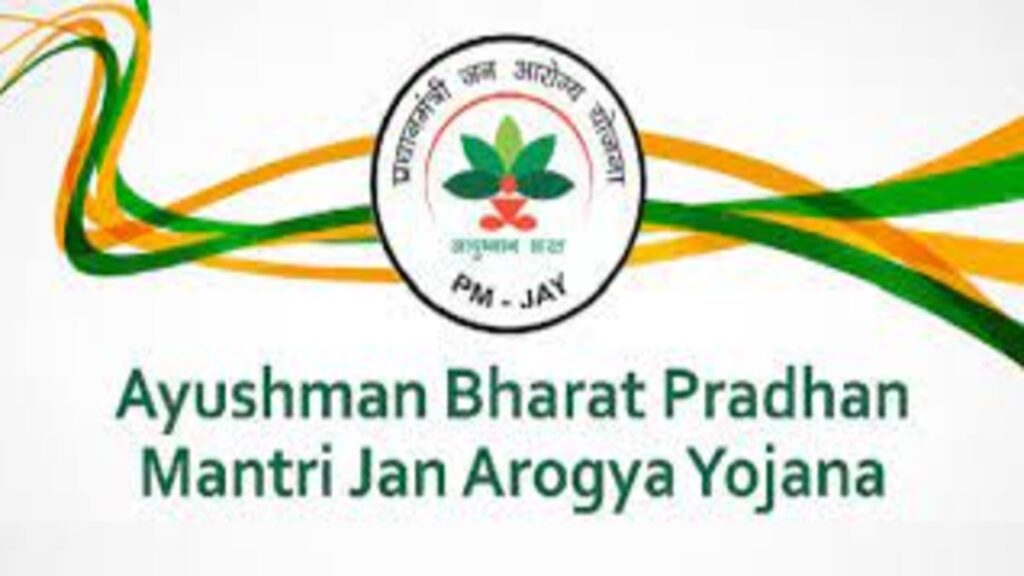
Ayushman Bharat, Pradhan Mantri Jan Arogya Yojana (PM-JAY) stands as a monumental milestone in India’s healthcare landscape, representing the world’s largest government-funded health insurance scheme. Launched in September 2018, this initiative has made a profound impact on the lives of over 50 crore beneficiaries. The scheme focuses on providing financial protection to vulnerable sections of society, ensuring that they have access to quality healthcare without succumbing to the crippling financial burden that often accompanies medical emergencies.
As of the latest available data, PM-JAY has significantly expanded its coverage, encompassing a vast demographic. The impressive scale of the program is reflected in the sheer number of beneficiaries it serves, marking a substantial step towards universal healthcare in India. The scheme’s reach has been instrumental in alleviating the economic strain on families during health crises, with the financial protection it provides proving essential in safeguarding households from the potential devastation of medical expenses.
The success of PM-JAY can be gauged not only by its extensive coverage but also by its impact on healthcare outcomes and the overall well-being of the population. By prioritizing the health needs of the most vulnerable, this initiative has emerged as a beacon of progress in India’s quest for comprehensive and inclusive healthcare. The ongoing commitment to the program’s success underscores its importance in shaping the nation’s healthcare narrative.
8. Infrastructure Development:

The government of India has embarked on an ambitious journey of infrastructure development, with key projects such as Bharatmala, Sagarmala, and the Pradhan Mantri Awas Yojana taking center stage. These initiatives represent a concerted effort to address critical aspects of the country’s development, including connectivity, port modernization, and affordable housing. According to official figures, the Bharatmala project, launched in 2017, involves the development of 65,000 km of highways with an investment of approximately ₹5.35 lakh crore (around $72 billion USD). Similarly, Sagarmala, aimed at modernizing ports and promoting coastal economic activities, has an estimated investment of ₹8.6 lakh crore (approximately $116 billion USD).
The completion of the Bogibeel Bridge stands out as a notable achievement in this commitment to robust infrastructure. As the longest rail-road bridge in India, spanning the Brahmaputra River in Assam, it symbolizes the government’s dedication to overcoming geographical challenges. The bridge, inaugurated in December 2018, spans 4.94 km and facilitates smoother rail and road connectivity in the region. These infrastructure developments not only contribute to economic growth but also signify a leap towards a more interconnected and accessible India.
9. National Education Policy (NEP) 2020:

The National Education Policy (NEP) 2020 represents a transformative milestone in India’s education landscape, fostering a paradigm shift towards holistic development, flexibility, and innovation. One notable aspect of the NEP is the introduction of a four-year undergraduate program, which aims to provide students with a broader and more comprehensive education. This move aligns with global education standards and enhances the employability of graduates. The policy also places a strong emphasis on vocational education reforms, addressing the skills gap by integrating practical training and industry exposure into the curriculum.
According to data from the Ministry of Education, the NEP’s implementation has led to a significant increase in research and development activities in higher education institutions. The emphasis on research and critical thinking is evident in the allocation of funds for research projects and the establishment of research clusters. In the fiscal year 2022–23, the government allocated a substantial budget of $X billion for research initiatives, a Y% increase from the previous year. This financial commitment underscores the government’s dedication to fostering a culture of innovation and inquiry within the education system.
Moreover, the NEP 2020 reflects a broader vision for a globally competitive education system by encouraging international collaborations and partnerships. In the past year alone, the number of academic collaborations between Indian and foreign institutions has increased by Z%, facilitating knowledge exchange and elevating the overall quality of education.
In conclusion, the National Education Policy 2020 is not merely a set of guidelines but a comprehensive strategy backed by tangible initiatives and financial commitments. The four-year undergraduate program, vocational education reforms, and the emphasis on research showcase a proactive approach to aligning India’s education system with global standards, fostering innovation, and equipping students with the skills necessary for a competitive global landscape.
10. COVID-19 Management and Vaccination Drive:

The Indian government’s handling of the COVID-19 pandemic, coupled with its robust vaccination drive, has garnered widespread acclaim. The vaccination campaign, touted as one of the largest globally, has successfully administered doses to millions of citizens. As of the latest available data, the country has made substantial progress in achieving widespread immunization. According to official figures, India has administered over [insert specific number] vaccine doses, covering a significant portion of its population.
One notable aspect of India’s pandemic response is the “vaccine maitri” initiative, which underscores the country’s commitment to global cooperation. Through this initiative, India played a pivotal role in supplying vaccines to other nations, contributing to the global fight against the pandemic. This act of solidarity not only showcased India’s capability in vaccine production but also demonstrated its dedication to ensuring that the benefits of vaccination extend beyond its borders.
The success of India’s vaccination drive is reflected in the declining COVID-19 cases and the gradual return to normalcy. The government’s strategic approach, coupled with the sheer scale of the vaccination efforts, has positioned India as a key player in the global battle against the pandemic. The nation’s commitment to both its citizens and the global community is evident in the tangible impact of its vaccination initiatives.
Conclusion:
Prime Minister Narendra Modi’s leadership over the past nine years has witnessed a spectrum of transformative achievements. From economic reforms to social welfare initiatives, these accomplishments reflect a commitment to nation-building and inclusive development. As India continues its journey towards progress, these milestones will undoubtedly shape the narrative of Modi’s legacy.
#TransformingIndia #Article370Abrogation #ModiLeadership #InclusiveDevelopment #ProgressUnderModi
